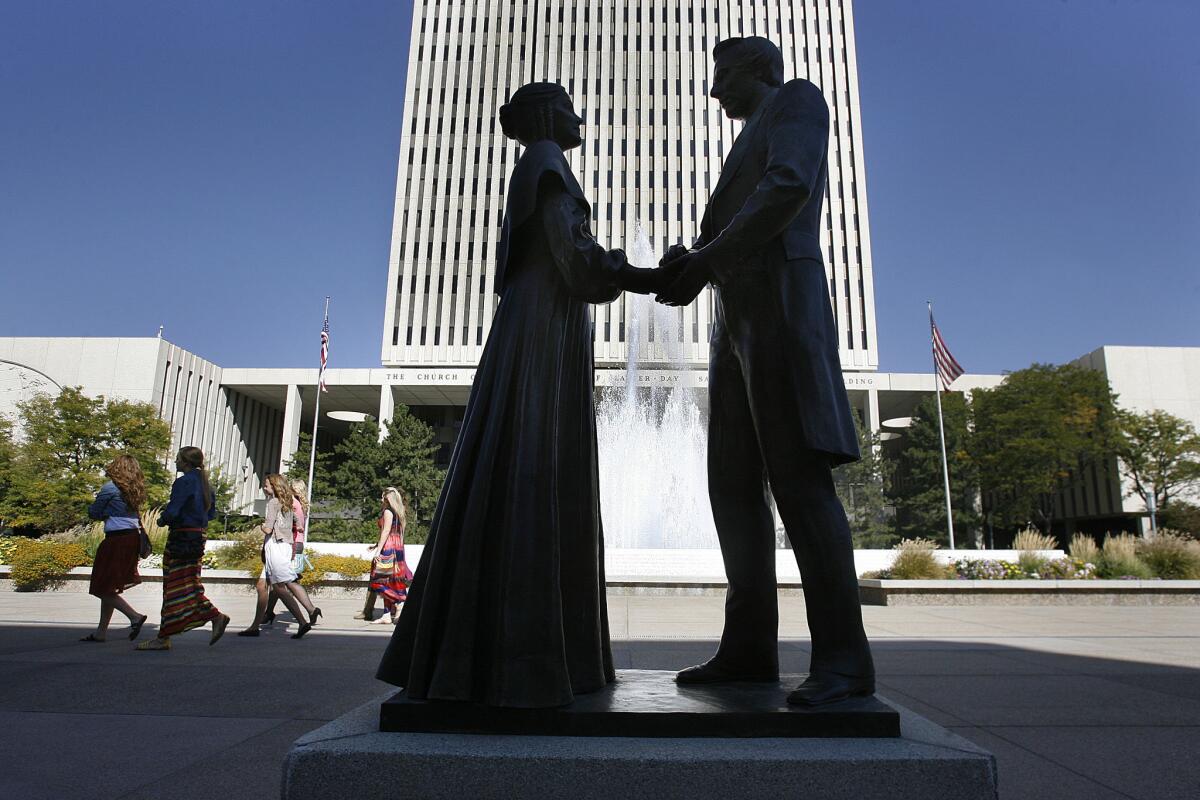Joseph Smith, Mormon Church founder, had as many as 40 wives

- Share via
Joseph Smith, Mormon church founder and prophet, took as many as 40 wives, at least one as young as 14, leaders of the Church of Jesus Christ of Latter-day Saints have acknowledged in a series of essays posted as guideposts for the faithful.
The church had previously acknowledged that Smith engaged in plural marriages, though the practice was one of the public attributes of its early days. The church formally abandoned polygamy in 1890, but the practice continues to be a cultural identifier in film, television and theater.
“The fact that Joseph Smith had plural marriage relationships is not new, of course,” Eric Hawkins, a church spokesman, said. The church said it acted based on new research and to provide a personal resource for its members.
“We live in a world where there is so much information available on every topic. And particularly in the age of the Internet, there are both good and bad sources of information. As a church, it’s important for us to research and provide official, reputable, historically accurate information about our history and doctrine,” Hawkins said.
The acknowledgment is significant because it signals an openness on the part of the religion, which has been wrapped in secrecy and whose practices involving women and minorities have raised questions among some of its own adherents. In that sense, Mormons are following in the footsteps of other Christian religions seeking to explore once-taboo issues, such as sexuality or same-sex marriage. The hope among religions is that greater transparency will make the churches more acceptable to modern audiences.
Born in upstate New York in the 1820s, nurtured in its early combative days in the Midwest, the Mormon religion followed the dream West. Adherents settled Utah, still the spiritual center of the religion.
In an essay posted on the church’s website, Mormons seek to explain the origin of polygamy in its early days in Ohio and Illinois. Polygamy is difficult to understand, says the essay, titled “Plural Marriage in Kirtland and Nauvoo.”
“Many details about the early practice of plural marriage are unknown. Plural marriage was introduced among the early Saints incrementally, and participants were asked to keep their actions confidential. They did not discuss their experiences publicly or in writing until after the Latter-day Saints had moved to Utah and church leaders had publicly acknowledged the practice,” according to the essay.
The roots of the practice date to Smith’s study of the Old Testament in 1831. Major biblical figures -- including Abraham, David and Solomon -- had more than one wife and were acting on God’s wishes.
“The same revelation that taught of plural marriage was part of a larger revelation given to Joseph Smith,” the essay notes. “Marriage could last beyond death and that eternal marriage was essential to inheriting the fullness that God desires for his children.”
Smith had 30 to 40 wives, according to the essay. The women ranged in age from 14 to 56, though most were between 20 and 40. Some were wives of Smith’s friends.
The prophet probably did not have sexual relations with all of the women because some were “sealed” to him just for the expected afterlife in heaven. The essay does note, however that polygamy was “an excruciating ordeal” for Smith’s first wife, Emma.
The official news of Smith’s marriage didn’t surprise many Mormons. On Feminist Mormon Housewives, an online blog, some said it had been expected.
“I’m a tween-aged Mormon girl in a Southern town ... I have always known Joseph Smith and early church members practiced polygamy. I get asked how many moms I have all the time; how could I not know?”
“I’m 19, and I go with my freshman BYU friends to Temple Square,” another wrote, referring to Brigham Young Universitiy. “We watch the film Joseph Smith: The Prophet of the Restoration, and I’m moved at the sacrifices of this man. I’m touched by his relationship with Emma. There is no mention of his other wives, and I don’t even notice. I don’t want to notice. I don’t want there to be other wives needing omission for this polished narrative.”
The church officially abandoned polygamy in 1890 with a manifesto issued under pressure from the U.S. government. The practice, however, continued for some years.
Those Mormons who refused to renounce polygamy eventually broke off to form splinter churches.
The most notorious recent case involved Warren Jeffs, the leader of one such schismatic group, who is serving life in prison after he was convicted in Texas in 2011 of sexually assaulting a child bride.
Follow @latimesmuskal for national news.
More to Read
Sign up for Essential California
The most important California stories and recommendations in your inbox every morning.
You may occasionally receive promotional content from the Los Angeles Times.










